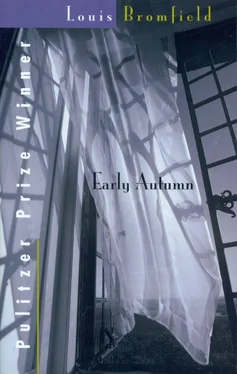From that day until the mills came to Durham the village sank slowly into a kind of lethargy, and the church itself, robbed of its strength, died presently and was changed into a dusty museum filled with homely early American furniture and spinning wheels—a place seldom visited by anyone and painted grudgingly every five years by the town council because it was popularly considered an historical monument. The Pentland family long ago had filtered away into the cold faith of the Unitarians or the more compromising and easy creeds of the Episcopal church.
But now, nearly twenty years after Olivia had come to Pentlands, the village was alive again, so alive that it had overflowed its little fold in the land and was streaming down the hill on the side next to the sea in straight, plain columns of ugly stucco bungalows, each filled with its little family of Polish millworkers. And in the town, across High Street from the white-spired old meeting house, there stood a new church, built of stucco and green-painted wood and dedicated to the great Church of Rome. In the old wooden houses along High Street there still lingered remnants of the old families … old Mrs. Featherstone, who did washing to support four sickly grandchildren who ought never to have been born; Miss Haddon, a queer old woman who wore a black cape and lived on a dole from old John Pentland as a remote cousin of the family; Harry Peckhan, the village carpenter; old Mrs. Malson, living alone in a damp, gaunt and beautiful old house filled with bits of jade and ivory brought back from China by her grandfather’s clippers; Miss Murgatroyd, who had long since turned her bullfinch house into a shabby tearoom. They remained here and there, a few worn and shabby genteel descendants of those first settlers who had come into the country with the Pentlands.
But the mills had changed everything, the mills which poured wealth into the pockets of a dozen rich families who lived in summer within a few miles of Durham.
Even the countryside itself had changed. There were no longer any of the old New Englanders in possession of the land. Sometimes in riding along the lanes one encountered a thin, silly-faced remnant of the race sitting on a stone wall chewing a bit of grass; but that was all: the others had been swallowed up long ago in the mills of Salem and Lynn or died away, from too much inbreeding and too little nourishment. The few farms that remained fell into the hands of Poles and Czechs, solid, square people who were a little pagan in their closeness to the earth and the animals which surrounded them, sturdy people, not too moral, who wrought wonders with the barren, stony earth of New England and stood behind their walls staring wide-eyed while the grand people like the Pentlands rode by in pink coats surrounded by the waving nervous tails of foxhounds. And, one by one, other old farms were being turned back into a wilderness once more so that there would be plenty of room for the horses and hounds to run after foxes and bags of aniseed.
It had all changed enormously. From the upper windows of the big Georgian brick house where the Pentlands lived, one could see the record of all the changes. The windows commanded a wide view of a landscape composed of grubby meadows and stone walls, thickets of pine and white birches, marshes, and a winding sluggish brown river. Sometimes in the late autumn the deer wandered down from the mountains of New Hampshire to spoil the foxhunting by leading the hounds astray after game that was far too fleet for them.
And nearer at hand, nestled within a turn of the river, lay the land where Sabine Callendar had been born and had lived until she was a grown woman—the land which she had sold carelessly to O’Hara, an Irish politician and a Roman Catholic, come up from nowhere to take possession of it, to clip its hedges, repair its sagging walls, paint its old buildings and put up gates and fences that were too shiny and new. Indeed, he had done it so thoroughly and so well that the whole place had a little the air of a suburban real-estate development. And now Sabine had returned to spend the summer in one of his houses and to be very friendly with him in the face of Aunt Cassie and Anson Pentland, and a score of others like them.
Olivia knew this wide and somberly beautiful landscape, every stick and stone of it, from the perilous gravel pit, half-hidden by its fringe of elder bushes, to the black pine copse where Higgins had discovered only a day or two before a new litter of foxes. She knew it on gray days when it was cold and depressing, on those bright, terribly clear New England days when every twig and leaf seemed outlined by light, and on those damp, cold days when a gray fog swept in across the marshes from the sea to envelop all the countryside in gray darkness. It was a hard, uncompromising, stony country that was never too cheerful.
It was a country, too, which gave her an old feeling of loneliness … a feeling which, strangely enough, seemed to increase rather than diminish as the years passed. She had never accustomed herself to its occasional dreariness. In the beginning, a long while ago, it had seemed to her green and peaceful and full of quiet, a place where she might find rest and peace … but she had come long since to see it as it was, as Sabine had seen it while she stood in the window of the writing room, frightened by the sudden queer apparition of the little groom—a country beautiful, hard and cold, and a little barren.
2
There were times when the memories of Olivia’s youth seemed to sharpen suddenly and sweep in upon her, overwhelming all sense of the present, times when she wanted suddenly and fiercely to step back into that far-off past which had seemed then an unhappy thing; and these were the times when she felt most lonely, the times when she knew how completely, with the passing of years, she had drawn into herself; it was a process of protection like a tortoise drawing in its head. And all the while, in spite of the smiles and the politeness and the too facile amiability, she felt that she was really a stranger at Pentlands, that there were certain walls and barriers which she could never break down, past which she could never penetrate, certain faiths in which it was impossible for her to believe.
It was difficult now for her to remember very clearly what had happened before she came to Durham; it all seemed lost, confused, buried beneath the weight of her devotion to the vast family monument of the Pentlands. She had forgotten the names of people and places and confused the days and the years. At times it was difficult for her to remember the endless confusing voyages back and forth across the Atlantic and the vast, impersonal, vacuous hotels which had followed each other in the bleak and unreal procession of her childhood.
She could remember with a certain pitiful clarity two happy years spent at the school in Saint-Cloud, where for months at a time she had lived in a single room which she might call her own, where she had rested, free from the terror of hearing her mother say, “We must pack today. We are leaving tomorrow for St. Petersburg or London or San Remo or Cairo. …”
She could scarcely remember at all the immense house of chocolate-colored stone fitted with fantastic turrets and balconies that overlooked Lake Michigan. It had been sold and torn down long ago, destroyed like all else that belonged to the far-off past. She could not remember the father who had died when she was three; but of him there remained at least a yellowing photograph of a great, handsome, brawny man with a humorous Scotch-Irish face, who had died at the moment when his name was coming to be known everywhere as a power in Washington. No, nothing remained of him save the old photograph, and the tenuous, mocking little smile which had come down to her, the way she had of saying, “Yes! Yes!” pleasantly when she meant to act in quite the contrary fashion.
Читать дальше












